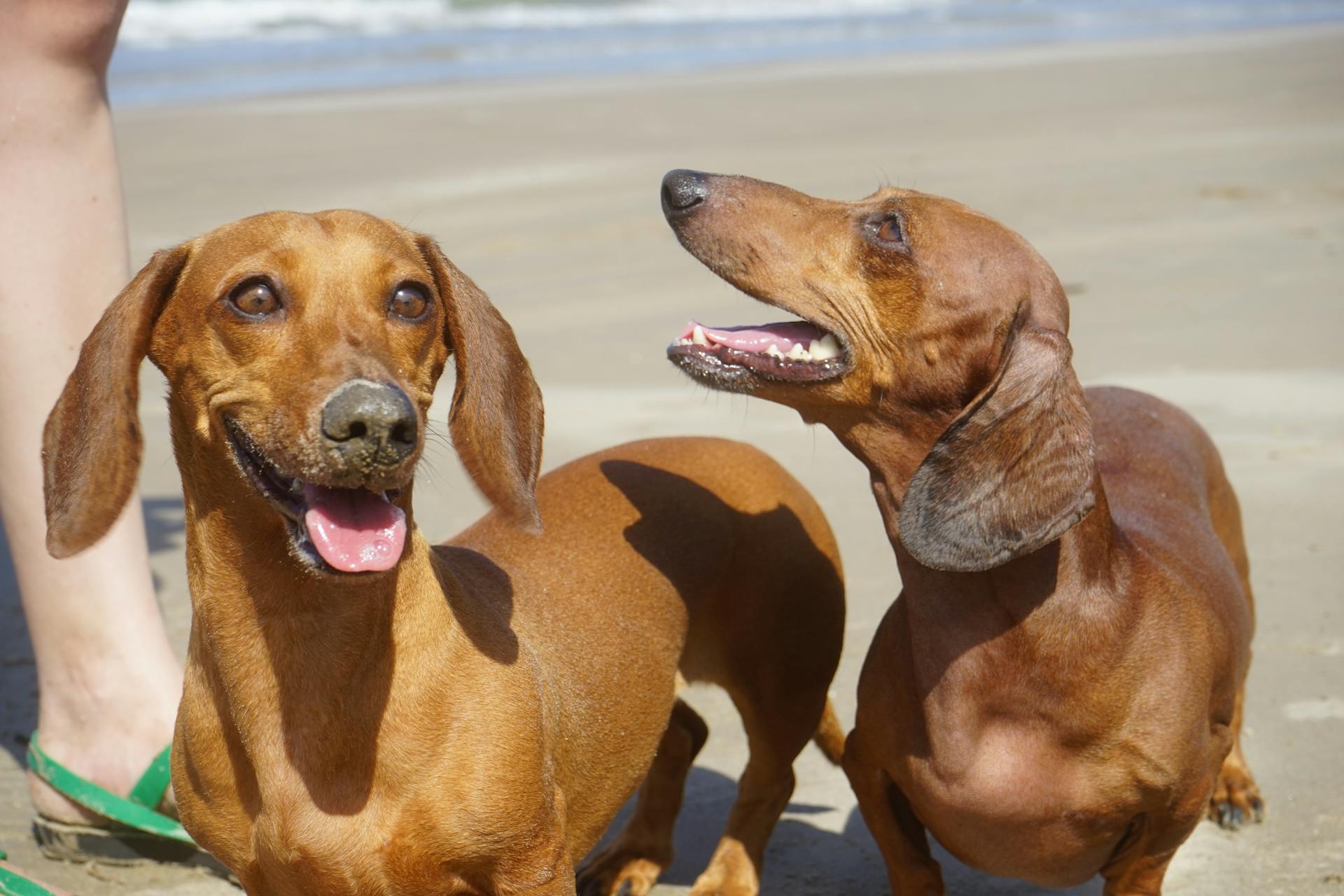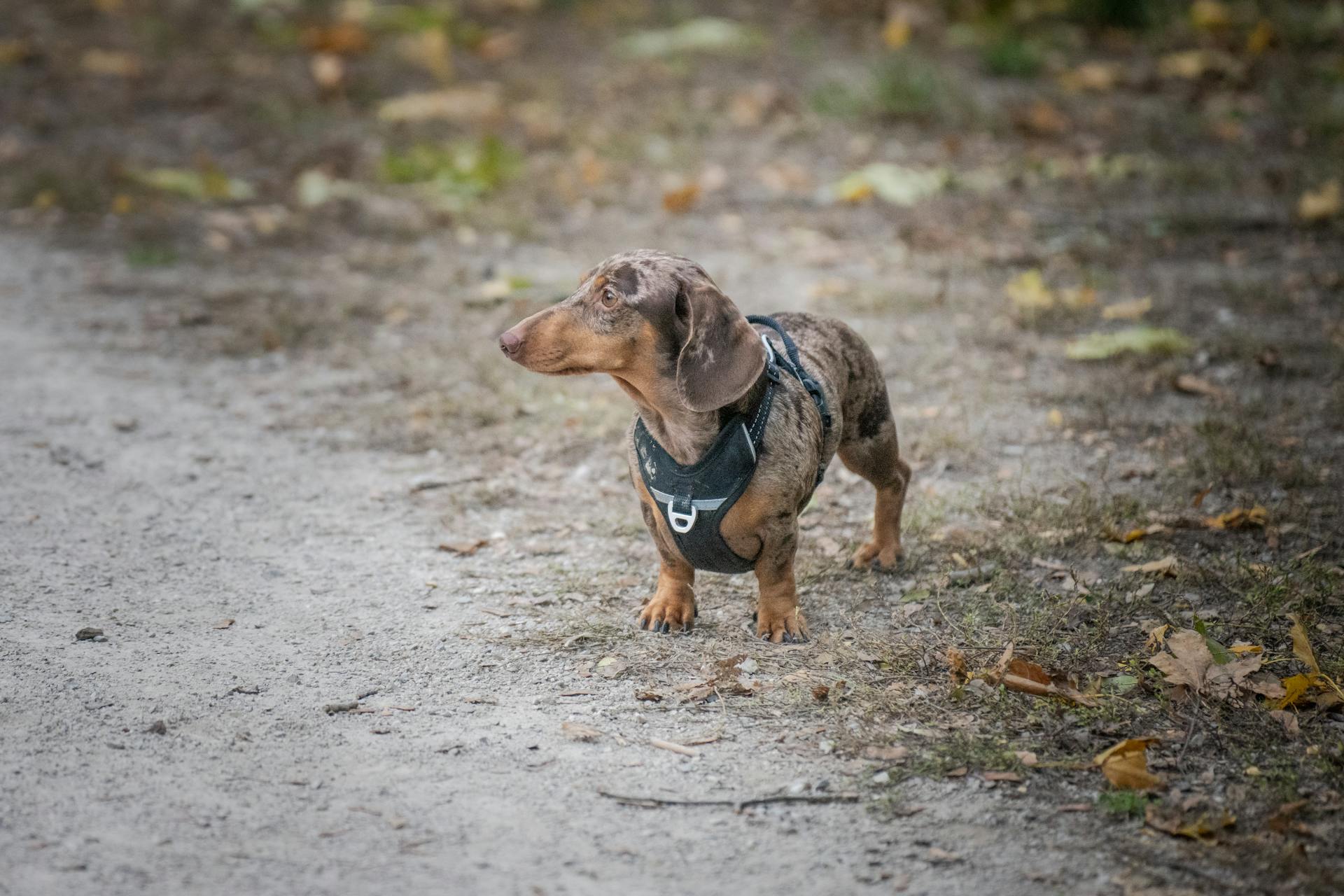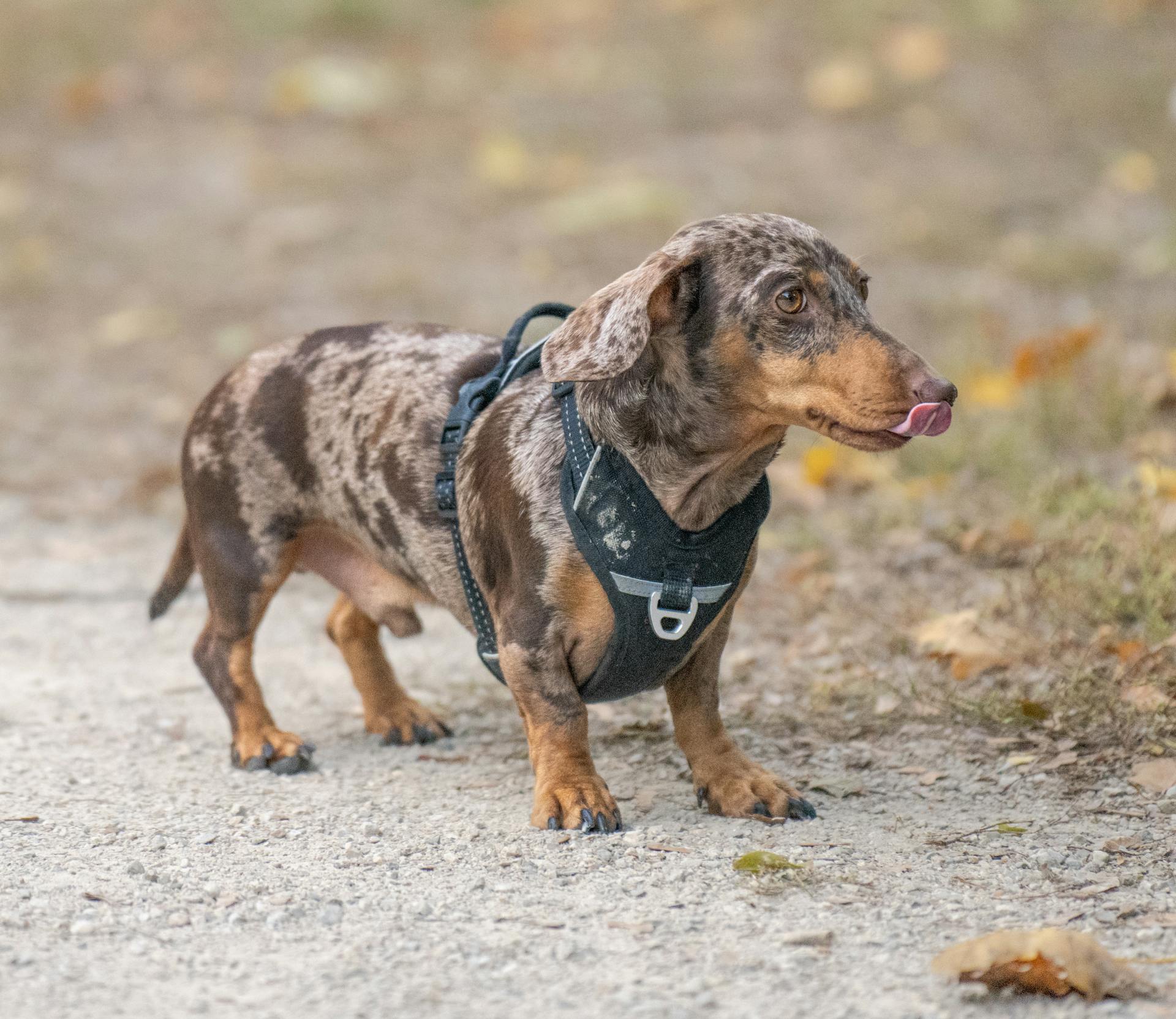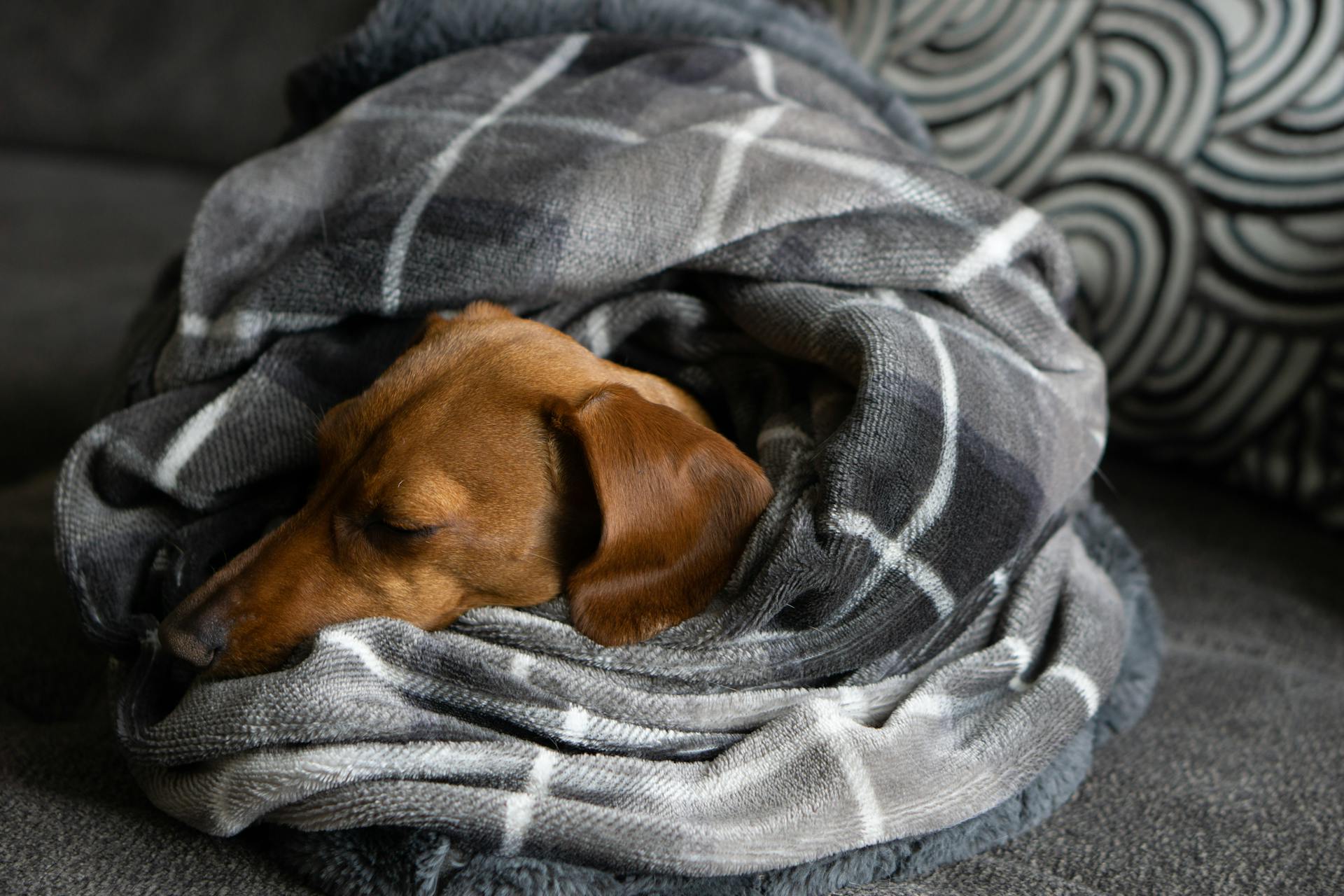
Welcoming a Doxiepoo puppy into your family is a thrilling experience, but it also requires careful consideration and planning. Doxiepoo puppies are a mix of Dachshund and Poodle breeds, and they need regular exercise and mental stimulation to prevent boredom and destructive behavior.
Doxiepoos are intelligent dogs that thrive on positive reinforcement training, which should start as early as 8 weeks old. Consistency and patience are key when teaching your Doxiepoo puppy good habits and manners.
Housebreaking is a crucial aspect of Doxiepoo puppy care, and it's essential to establish a routine and stick to it. Doxiepoos are known to be relatively easy to housebreak due to their small size and intelligence.
Expand your knowledge: Full Grown Doxiepoo
Physical Characteristics
The Doxiepoo's size can vary significantly, ranging from as little as 10 pounds to over 30 pounds, and their height can be anywhere from 5 to 15 inches tall.
These small to medium-sized dogs have a sturdy and shorter body than they are long.
Their heads are typically round, and they have large dark eyes full of expression.
The nose is usually proportionate to the muzzle and is black and round.
Doxiepoos can have light or dark-colored eyes, including brown and hazel tones.
Their coats can be curly, soft, and low-shedding, similar to a Poodle's, or short and smooth, similar to a Dachshund's.
Colors can include black, brown, liver, chocolate, gray, red, white, and cream, and they can also have coats of more than one color with different markings and patterns.
Their coat types can vary from short and wavy to long and curly, and it's hard to predict what coat type they will have, even based on their parents.
Not all Doxiepoos inherit the Poodle's lower shedding, hypoallergenic coat, as mixed breeds are unpredictable.
Doxiepoos can come in a range of colors, making each one unique and special.
Their height and weight can vary depending on the size of the Poodle parent, with some dogs weighing as little as 5 pounds and others boasting over 30 pounds.
Health and Care
Doxiepoo puppies can live quite a long time, typically between 10 to 18 years. They are generally a healthy breed, but like all dogs, they can be prone to certain health issues.
Some health issues that may affect Doxiepoos include intervertebral disc disease, hip dysplasia, patellar luxation, and thyroid issues. Regular exercise, a healthy diet, and regular veterinary check-ups can help prevent or manage these conditions.
To keep your Doxiepoo happy and healthy, it's essential to provide daily exercise, such as walks around the neighborhood or park. They also enjoy participating in daily activities with their family. To maintain dental health, clean their teeth at least twice a week, and trim their nails as needed to avoid clicking against the floor.
Here are some common health issues that may affect Doxiepoos:
- Intervertebral disc disease
- Hip dysplasia
- Patellar luxation
- Thyroid issues
- Addison’s disease
Health
Doxiepoos are generally a healthy breed, but like all dogs, they can be prone to certain health issues.
Living between 10-18 years, Doxiepoos can develop conditions like Intervertebral Disc Disease (IVDD), which causes hardening of the intervertebral disc and can lead to severe pain and partial paralysis.
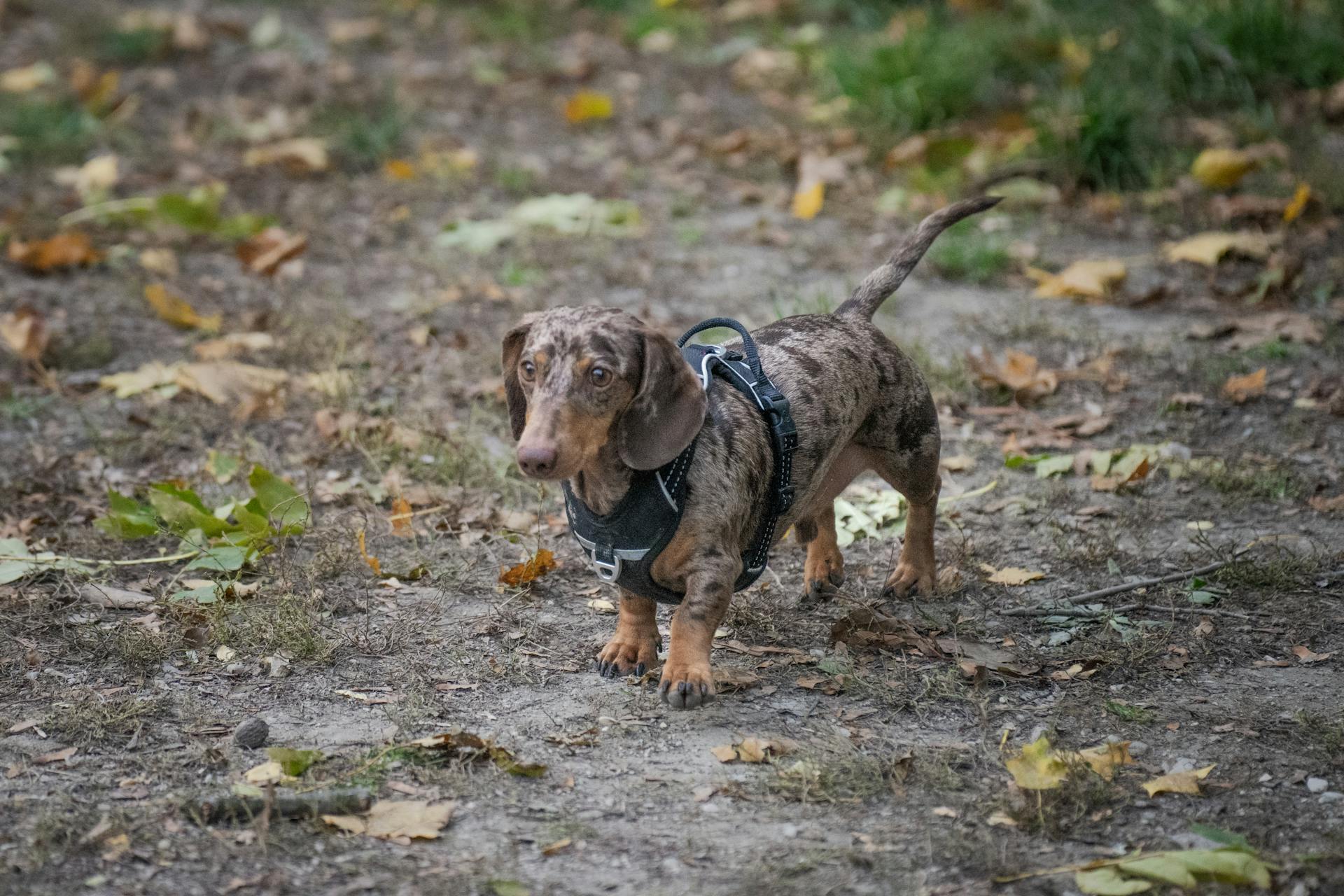
To minimize the risk of back injuries and IVDD, it's essential to help your Doxiepoo maintain a healthy weight and prohibit them from jumping on or off the furniture.
Doxiepoos can also be prone to Patellar Luxation, a condition where the kneecap moves out of its normal location, making it hard for dogs to put weight on the affected leg.
Regular eye exams can help catch eye issues like Progressive Retinal Atrophy and Cataracts early, ensuring your Doxiepoo has a lifetime of good vision.
Some common health issues in Doxiepoos include Hip Dysplasia, Patella Luxation, Thyroid issues, and Addison's disease.
Here are some key health considerations for Doxiepoos:
Nutrition
Doxiepoos do best on food formulated for medium and small breeds. Their dietary needs will vary based on their size, so it's essential to choose a food that suits them.
A mix of dry kibble and wet food is best for Doxiepoos. This combination provides a balanced diet and helps prevent overeating.
A unique perspective: Puppys Food

Stick to real animal proteins and natural ingredients in your Doxiepoos' food. Avoid free-feeding them, as they are prone to overeating.
Doxiepoos will eat between one to two cups of food a day, depending on their size. Be careful not to overfeed them, as they struggle with obesity.
You should talk to your vet about specific food portions and treat allotments for your Doxiepoos.
Care
Doxiepoos require regular nail trims, ear cleanings, and routine dental care to stay healthy. Brushing your Doxiepoo's coat at least once a week is a must, especially if their coat is long or curly.
They need daily exercise, but it doesn't have to be intense. A 30-minute walk or playtime is enough to keep them happy and healthy. Doxiepoos enjoy going on walks around the neighborhood or park, and they love being around their family as much as possible.
Regular physical and mental stimulation is key to preventing boredom and destructive behaviors. Engage your Doxiepoo in daily activities, such as dog sports or agility work, to keep them challenged and happy.
Expand your knowledge: Doxiepoo Images
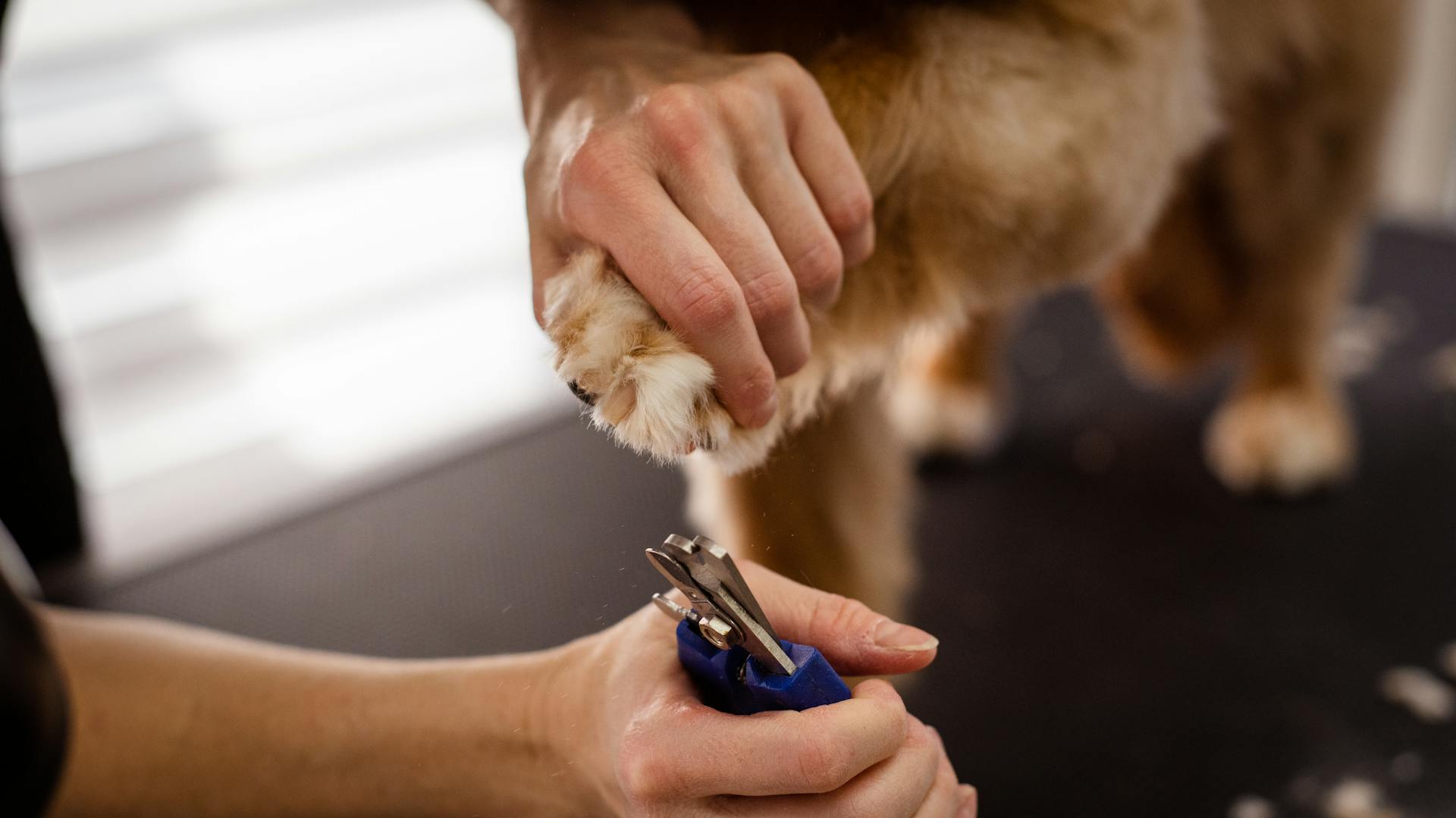
Teeth should be cleaned at least twice a week, and ears should be cleaned every so often with a veterinary-approved solution to avoid ear infections. Doxiepoos are prone to overeating, so it's essential to monitor their food intake and provide only a few treats.
A consistent grooming routine can help prevent potential health issues and keep your Doxiepoo looking and feeling their best. They require professional grooming every 6-8 weeks to keep their coat trimmed and well-maintained.
Doxiepoos are intelligent and energetic dogs that need daily mental and physical stimulation. They can develop a hobby of learning new tricks or participating in dog sports like agility events.
Temperament and Training
The Doxiepoo temperament is a unique blend of their Dachshund and Poodle parents. They're known for being friendly, affectionate, and playful, making them excellent companions for families, singles, and seniors alike.
Doxiepoos are intelligent and eager to please, which makes them relatively easy to train, although they may also inherit the stubbornness of their Dachshund parents. Consistency and patience are critical, as some may require more time to learn.
They respond well to positive reinforcement training methods, such as treats, cuddles, and toys. Early socialization and consistent, reward-based training approaches work best to develop a well-mannered pup.
Here are some key training tips for Doxiepoos:
- Keep training sessions short and fun.
- Schedule multiple short obedience training sessions throughout the day.
- Use positive reinforcement methods, such as treats and praise.
- Be consistent and patient, as some Doxiepoos may be more stubborn than others.
By following these tips and providing plenty of love, attention, and exercise, you can help your Doxiepoo become a well-behaved and confident adult dog.
Temperament & Intelligence
The Doxiepoo temperament is a unique blend of their Dachshund and Poodle parents. They're known for being friendly, affectionate, and playful, making them excellent companions for families, singles, and seniors alike. Doxiepoos are intelligent and eager to please, which makes them relatively easy to train.
Their energy level can vary, but most are moderately energetic and enjoy regular walks and play sessions. Some may inherit the Dachshund's hunting instincts, so it's essential to keep an eye on them around small animals and children.
Doxiepoos are quick learners and respond well to positive reinforcement methods. Consistency and patience are critical, as some may inherit the stubbornness of their Dachshund parent. Early training and socialization are essential to ensure your Doxiepoo is comfortable around new people, animals, and environments.
Explore further: Golden Doxiepoo
Here are some key temperament traits to keep in mind:
- Friendly and affectionate
- Playful and energetic
- Intelligent and eager to please
- May inherit Dachshund traits like stubbornness or hunting instincts
- Can be big barkers, especially if not socialized early
Overall, Doxiepoos are loyal, loving, and intelligent companions that require regular exercise, mental stimulation, and positive reinforcement training to thrive.
Dachshund Poodle Mix Facts
The Doxiepoo is a unique breed that inherits the best traits from its parent breeds, the Dachshund and the Poodle. They can have a wide variety of coat types, from short and wavy to long and curly, and come in a range of colors including black, brown, liver, chocolate, gray, red, white, and cream.
Their temperament is loyal, loving, intelligent, and playful, making them wonderful family dogs. However, they can be stubborn or bark excessively if not properly trained or socialized.
Doxiepoos are generally good with children and adults, but they may bark a lot when they first meet them. Gentle behavior from children is essential to ensure a loving relationship between the Doxiepoo and the child.
Early socialization is key to ensure that Doxiepoos get along with other dogs or animals in the household. They prefer to be the only pet in a home, but with proper training and care, they can be great with other pets.
Here are some fun facts about Doxiepoos:
- They may be called "doxiedoodles" by some, but they are one in the same as Doxiepoos.
- They come in a range of sizes, from small to medium, depending on their parent breeds.
- They have a moderate energy level and need daily walks and playtime to stay happy and healthy.
- They can be prone to health issues such as Intervertebral Disc Disease (IVDD), patellar luxation, obesity, and eye problems.
- They require regular grooming to prevent matting and keep their coat in good condition.
Overall, the Doxiepoo is a lovable and loyal breed that makes a great family pet. With proper training, socialization, and care, they can thrive in a variety of living situations.
Living with a Doxiepoo
Living with a Doxiepoo requires a lot of attention, so if you're away from home for long periods, it's best to consider getting another pet to keep them company.
They need regular walks and playtime, and a secure yard is a must. They can get into trouble if left unsupervised, so keep an eye on them at all times.
Doxiepoos are great watchdogs and can be protective of their family, but they can be loud, so be prepared for some noise. They'll alert you to any strangers approaching your home, but you might want to consider a more subtle alarm system for your neighbors' sake.
Crate training is a good idea to help with separation anxiety, and keeping them in a calm, secure area when alone can help prevent high-strung behavior. They don't like loud noises, so a quiet space is essential.
With the right care and attention, a Doxiepoo can thrive in a variety of living situations, from apartments to homes with yards.
Living Conditions
Doxiepoos thrive in homes with owners who can give them plenty of attention, walks, and love. They need owners who are home a lot.
They can adapt to various family types, including seniors, families, and households with other pets. However, their loud barking can be a concern for those living in close quarters.
A secure yard is essential for Doxiepoos, as they can easily find escape routes. Leaving them unsupervised outside is not recommended.
Crate training can help alleviate separation anxiety in Doxiepoos, which can develop if left alone for too long. They also don't like loud noises.
Doxiepoos can be good watchdogs and guard dogs due to their attentive and protective nature. They will not hesitate to get loud to alert their owners to potential threats.
Rescue Groups
Living with a Doxiepoo can be a rewarding experience, but what happens if you need to find a new home for your Doxiepoo or want to adopt one?
It may be hard to find a breed-specific rescue for Doxiepoos because they are a mixed breed.
You can try contacting Dachshund Rescue of North America, Inc. or Carolina Poodle Rescue, as they often care for mixes.
If you're looking for a rescue group that specializes in Doxiepoos, it may be challenging due to their mixed breed status.
However, reaching out to these organizations is a great place to start your search.
Here are some rescue groups you can try:
- Dachshund Rescue of North America, Inc.
- Carolina Poodle Rescue
Ownership and Costs
Owning a doxiepoo puppy can be a significant investment. The initial cost of a doxiepoo puppy can range from $250 to $2,000, depending on the bloodline and pedigree of its parents.
You'll want to look for reputable breeders who can provide you with information about the parent dogs, previous litters, and health screenings performed. Always ask questions about care and what to expect.
Be prepared to invest a few hundred dollars in supplies and initial setup, including crates, food, toys, blankets, and puppy pads. First-year puppy costs will also include vaccinations and a spay or neuter procedure.
Frequently Asked Questions
How big will a DoxiePoo get?
A DoxiePoo typically stands 5-15 inches tall and weighs 10-30 pounds, with males generally being taller and heavier than females. However, size can vary depending on the parents' size, with some DoxiePoos weighing as little as 5 pounds.
Featured Images: pexels.com
